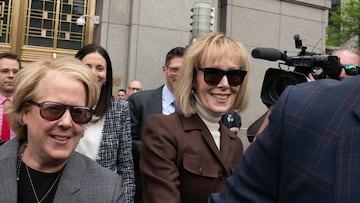What did E Jean Carroll accuse Donald Trump of in her testimony?
A judge ruled Trump liable for defamation of E Jean Carroll based on a jury verdict from earlier this year that found he sexually abuse and defamed her.

A New York judge has ruled that a verdict handed down by a jury in a civil trial earlier this year, finding that he sexually abused E Jean Carroll and defamed her, will carry over to a separate 2019 defamation lawsuit she filed against him. The ruling by Judge Lewis Kaplan will streamline the proceedings of the case which is scheduled to go to trial 15 January 2024.
At that time, the trial will be limited to awarding damages to Carroll, who is seeking $10 million. In the first civil trial this spring, the jury ordered Trump to pay her $5 million in damages. Judge Kaplan also ruled on Wednesday that damages would not be capped, thus the previous award will not be factored into those which will be decided in January.
What did E Jean Carroll accuse Donald Trump of in her testimony?
Elizabeth Jean Carroll, the writer of the longest-running advice column in Elle magazine from 1993 to 2019, is one of many high-profile women who have accused former President Donald Trump of rape.
In 2022, around four years after she came forward with the allegations, Carroll sued Trump for battery under the Adult Survivors Act. The New York law was passed the year prior and gives victims of sexual violence to sue the aggressor, even in cases where the statute of limitation has passed.
Carroll also sued the former president for defamation as part of her 2022 lawsuit for comments he made after she went public with her story.
In Judge Kaplan’s 25-page ruling he wrote that the jury in that case “considered and decided issues that are common to both cases,” and its verdict and the undisputed facts “establish that Mr Trump’s 2019 statements were made with actual malice.”
Judge rules Trump is liable in second E. Jean Carroll defamation case, with jury to decide damages in January. https://t.co/oqtZexp1vZ pic.twitter.com/Beg8qR1bAj
— CNN (@CNN) September 6, 2023
Carroll’s emotional testimony
The earlier two-week trial began on 26 April, and the court heard testimony from Carroll on the first day.
The writer provided graphic details of the attack, which Carroll says took place in late 1995 or early 1996. She testified that she ran into Trump in New York City outside of Bergdorf Goodman, and he asked for her help to pick out a gift for a friend. Carroll was asked if she found Trump attractive, and she responded in the affirmative and also noted that she was initially pleased to have bumped into him; she told the court that she thought it would be a fun story, the kind one tells at a dinner party. “I’m a born advice columnist. I love to give advice, and here was Donald Trump asking me to give advice about buying a present,” she told the court.
The former president, then a real estate mogul in the Big Apple, directed her toward the lingerie section and pressured her to try something on. Carroll described the mood as light and jovial. But then, Trump began to take her by the arm towards the dressing room, and she walked through an open door, and he followed her in and locked the door.
During the testimony, the columnist said “it didn’t occur to” her to say no or try to exit the situation. When the two were in the dressing room, Carroll said that Trump “immediately shut the door and shoved me up against the wall.” She recalled banging her head and that it was at that moment that she realized “that what I thought was happening was not happening.” The mood became dark, and realizing that she was much smaller than Trump, that she was unable to stop him from pulling down her tights. He was able to overpower her and went on to rape her.
In tears, she explained the impact the event had on the rest of her life. “It left me unable to ever have a romantic life again,” said the writer, explaining that she felt if she told people that she was raped that they would look at her “as soiled goods.”
BREAKING: After Trump's team decided to not offer a defense in the E. Jean Carroll Vs. Donald Trump Rape and Defamation suit, the Verdict is in!
— Brian Krassenstein (@krassenstein) May 9, 2023
The jury of 9, including six men and 3 women, deliberated for just under 3 hours, an incredibly quick deliberation, finding Trump… pic.twitter.com/0ilUSCZrNJ
Donald Trump refused to testify
Related stories
Donald Trump denied wrongdoing though did not testify in court. He gave a taped, 45-minute disposition which was viewed by the jury.
He was found liable for sexual assault and defamation, but not rape. Trump is appealing that verdict.

